- Home
- Harry Harrison
The Military Megapack Page 19
The Military Megapack Read online
Page 19
Hymie Kaplin tugged at his chin strap and moodily wondered if he could cheat the Lord out of a life, and if so, for how long? He had always been convinced beyond a reasonable doubt that opportunity existed throughout this great, spreading world for the fellow who played the lone-wolf with a little derring-do.
Confidentially, though, Hymie Kaplin was a great disappointment to his mother in Brooklyn, and he had to do something desperate, like joining the R.A.F. to save face. He cupped his headphones over his ears and listened to Squadron Leader Whiteley answer the Intelligence geezer at the advanced spotter station somewhere below.
“…Messerschmitts at twenty thousand plus,” the duty officer’s voice was casual. “Check over Number Nine Kite, due N. W.” These English guys were always too, too utterly casual to satisfy Hymie Kaplin. He wondered now if the D. O. knew No. 43 had been detailed to down a new ME-109-G, or how the task was to be accomplished?
“All right, Red Flight,” Whiteley’s tone was hardly less bored. “Section B line up for wedge-attack. No chasing Jerry across the gulley. I’ll concentrate on the one-oh-nine-Gee.
The lid was off!…Hymie was reminded that he had come out of the needled beer and wonderful nonsense era of American history, and in order to show that he did something partially legitimate for a living, he had stepped up in a direct and forthright manner and taken a welterweight named Al Winger from his manager.
He had simply leveled a pistol-like look at the manager, and told him, in the quaint verbiage of 1930, to ooscray umbay, and with this one laudable stroke of keen business he had become a full-fledged fight manager.
Thereupon Al Winger had knocked out Hammy Randell for the welterweight crown in the suspiciously swift time of 1m, 32s, and it had set the fight mob to debating the momentous question; “Did Randell fall or was he pushed?”
So Hymie had lost cast and standing with his adored mother, and nothing that he had done could regain for him that high place in her affections and esteem, until the war came along and he had joined the R.A.F. He loved his mother, but he had always made his own way, feeling he could get along better that way. That was what he liked about Whirlwinds.… You made your own way.…
Now Hymie gave a mild and plaintive moo and turned on his air. He used oxygen as he had once used the solace of beer after a particularly bitter defeat of the Dodgers by the Giants. Why was it Whiteley always refrained from chasing the Ratzi across the Channel? Whiteley, they said, had won the D.S.O. and D.F.C. at Dunkirk, and had been among those few—now mostly dead—to whom Mr. Churchill said so many owed so much.
A hero, and still only a squadron leader! Hymie reflected upon this for the steenth time and decided the guy just didn’t have any push.
* * * *
The steel cables coming up from the London streets below were invisible now and the fat, friendly barrage balloons floating at their spliced ends were behind. Whiteley turned and climbed fast, and Hymie decided that had he been boss here he would have headed straight out over the white cliffs of Dover and climbed from there.
The appearance of four new German high performance warplanes on the world’s battlefronts in the past few weeks indicated, the brass hats insisted, that Reichmarshal Goering had achieved a major retooling swap-over in the German aircraft industry.
There had appeared a Heinkel 177 four-motored, two-propellered heavy bomber; a pressure-cabined Junkers 86-P bomber-reconnaissance plane with a ceiling above forty thousand feet; a new Focke-Wulf 190—and the new Messerschmitt 109-G, described by the nervous brass hats as a high altitude, partly armored plane with a liquid-cooled 1,700 horsepower engine.
Whiteley had devised the wedge formation to assure their getting one of these new Messerschmitts that the ground men seemed so anxious to examine at close range. Whiteley led off because, as he explained, an experienced leader should recognize the 109-G more quickly than anyone else, and if he had to center downing one for the brass hats, he was entitled to a little personal protection. To Hymie it all seemed like a lot of foolish rah-rah stuff from the Rugby fields of dear old Oxford.
* * * *
They spotted the crooked black crosses winging in over Southend. Whitley swung south, still climbing, and the Whirlwind formation followed suit so that Hymie, in No. 2 slot, could see the Heinies better. There was a triple line of twin-engined ME-115’s behind which huddled a formation of Heinkels in what appeared to be a Lufberry defense circle.
Hymie’s headphones crackled. “In place astern, take the fighters first.” Whiteley’s voice was no longer suave. “Take one each, then double up, lads. You shadow me, Kaplin.”
That meant that if Whiteley was kayoed, Hymie was to take over and try to burst the liverwurst Whiteley had been kiting after.
Hymie frowned. Why had Whiteley selected him for his rudder-runner? Damn it, he’d put in three months outside of the reserve gang. He’d been blooded in a battered old Bristol Beaufighter almost six months ago. Now he was in No.2 slot in Section A, with his first full row of braid and commanded to tail the S. L.… This because the big shots wanted a 109-G.
Luzon in Section B was bragging about weightlifters again. Luzon was a burly French-Canadian who loved to flex his biceps. There was the solid squareness of a Quebec house about Luzon. He had a voice a like a bullfrog with a sore throat, and he was always telling the world how weightlifters could do everything else better than anyone else. He believed this of course.
“Sometime soon, Luzon,” Whiteley was saying, “the W. C will take you on a rhubarb raid over Abbeville!”
“I betcha John Davis, the American heavyweight weightlifting champion could outpress Herr Josef Manger, the German record holder.”
“Will you,” demanded Whiteley, “forget about weightlifters for fifteen minutes?”
“Fifteen minutes? Golly, he couldn’t forget ’em for—” began young Freddie Hayward, but Whiteley shook his fist and they went into the scrimmage.
The fighters looked like yellow hawks. There was a mad stew of struts, clouds, metal, and exhaust smoke as the Whirlwinds slammed after them.
Hymie brought his wing tip up close to Whiteley’s rudder and hung on. He watched the S. L. execute a perfect buzz saw against a monster Heinkel’s stabilizers. He could see the Squadron Leader’s propeller slice through startled fabric like an angry circular saw going through a board.
The 177 flopped like a stricken whale and sounded for the depths, twisting, and out of control.
“Watch that fighter coming down at you, Hastey!” Whiteley warned a Section C man.
Hymie’s eyes swiveled nervously. He wondered how Whiteley did so much and saw so much at the same time.
“Shadow me, Kaplin! Hang on, Yank! There’s one—see? That blighter with the shark’s nose! This way, Kaplin!”
Hymie kicked up his tail and followed. Followed through the Whirlwinds, jibed over hard and belted after the short-winged Mess-up that flaunted a swastika on its rudder. Hymie saw the quick bursts of a saffron flame coming from the two guns, and the belch of the 20-mm. cannon in the Boche’s nose.
Hymie blundered into a batch of slipstream from Whiteley’s prop. His red brows like miniature bushes over his pale blue eyes, he grinned happily, ruddered hard, overcontrolled and came up his guns full on a two-seater Jaguar’s snout. He pressed the button and his Whirly recoiled behind the ugly snarling of his eight-gun broadside. There was a dull explosion, a burst of liquid flame and the Jaguar threw away an engine, then swiftly began to chase it to the ground—spewing pilot and gear as it did so.
“It’s a long way down,” Hymie yelled. “It’s a very long way down, bums!”
He swung his ship around, his teeth square and white against the red of his face. A burning Whirlwind tumbled past his greenhouse and Hymie’s lips came down tight and thin over his grin.… It was Whitley’s Whirly!
That was the S. L. going down with the draft open wide.… The enemy had flamed Whiteley—Whiteley, the Squadron Leader!
The realization clouted Hymie lik
e a fist to the mandible.
“I rode your rudder as long as I could, pal,” he mumbled. “It was damned tough luck all around—still, I got that Jaggy.”
He wandered through Whiteley’s smoke scarf, and with the others, popped away at Mess-ups and bombers, mainly to erase a persistent screen before his eyes that kept writing, “You burst a liverwurst, louse—but Whiteley went a flamer.”
The enemy ships suddenly turned tail and headed back over the Channel and Hymie felt something uncomfortable at the nape of his neck now, like unto prickly heat and the barber’s itch. He found himself leading the squadron back home and wondered how he got there. He reached up and dragged the hatch back and let the wind slap some of the guilt off his homely face.
He switched his flap-mike off and muttered, “In my league it’s always been every man for himself. Why was I made responsible for Whiteley? Him and his teamwork! They’ll tear a stripe off me for this. Well, I did the best I could.”
The Whirlies ran in and lined up along the patch worn out of the turf by the churning of heavy lorry wheels and the splash of lubricating oil. Cornish, the Senior Adjutant, came along in front of a hustling crew of aircraftsmen. Hymie tried to ignore the question marks on their upturned faces. He gathered up his gear and waddled, rubber-legged, past the crash-truck.
Cornish had been in the other war and didn’t have much to say. But he wanted his convictions confirmed. “What happened?”
Then Broadfoot, the sloppy tramp who acted as Intelligence, appeared. Broadfoot had once written a book—which accounted for his know-all air. He stood beside Cornish now, fat hands on his big, bouncy hips.
Hymie shrugged out of his Mae West. “Dunno what happened.” He strode into the briefing room. “I was shadowing him, then lost him and had a jab at a Jaguar.”
“All we got was the business of going after the One-oh-nine-G,” bayed Broadfoot. “Did Whiteley order you to follow him?”
“Whiteley was snapping all over the sky. I couldn’t follow him. I tell you I don’t know what happened. I don’t even know if he got the One-oh-nine-Gee.” The others circled him in the hut, peered at him out of puzzled orbs. His jaw dropped open like the tailboard of a G. S. wagon. He could just make them out in the dim light. There was Luzon, Freddie Hayward, Ingerowski, Stengel, Norton and Swifty Morris. All these guys had come up from gunnery school with him, yet they acted like strangers. There was Smith and Butler he had known in New York. Hastey and Doorn, the Hollander, who flew like something out of a Flash Gordon adventure. Now they were all ruthlessly trampling his finer feelings under foot. His sensitive nature was mortally wounded.
The little Dutchman tried to break it up, but his English failed him and Cornish began passing’ out combat reports. Life-loving fuzzy-cheeked kids, were sitting down before the Intelligence geezers, dutifully reporting what they had seen and tried to do—solemn with the realization that they had come through a scrimmage and were still here to answer questions. The loud speaker on the wall blurted with tired authority, “Yellow Flight airborne. Interception taking place over Bluesea (code name) at thirty-five thousand. Command advised—crackle—buzzzz—Enemy aircraft returning to French area seventy-nine-N-thirty-four.
Hymie leaned against the wooden bench bolted to the wall and stared up at the operations-area map and tried to remember where they had fought with the fruitcakes.
“Did you,” he asked Luzon, “see the Jaguar I jolted?”
“Sure! I saw her go down like a weightlifter under a missed two-hands snatch.”
‘“Thanks. I just wanted to make sure I did something right.”
“It came through on the teleprinter,” Cornish called. “They pulled your Jaguar out of the Thames, Kaplin!”
“And he was rowing on the Thames,” recited Swifty Morris in a canorous voice, “his—lights—burning—clear!”
“Put out that lantern!” squeaked Freddie Hayward, sticking out his chest like an air-raid warden. “Charge: Rowing on the Thames with a lantern in the stern.”
“Maybe this guy wants to build some muscles,” boomed Luzon. “Tell him to take up weightlifting!”
The fun was on again. They were trying to cast aside the gloom caused by the loss of Whiteley. Hymie tried to become part of it. He failed. He swung around and ran smack into Cornish.
“Relax, Kaplin.”
“I tried to stay with Whiteley,” snarled Hymie, waving his short arms. “It’s the truth. Take it or leave it!”
“Come on wit’ me, Hymie,” Luzon said. “We take a good workout wit’ the weights. I know a place.”
“Vot iss?” asked Doorn, perplexed.
“Why don’t the bums say what they think instead of punning about a dory. This frankfort slid into my sights and I splashed him with some mustard!”
All right,” said Cornish softly, “maybe it was a deflection shot that hit Whiteley.… By the way, the Wingco wants to see you.”
“Sure,” thundered Luzon, “she deflection shot. One fallow she let it go, other fallow he catch it. It is fate. Like the time I miss that bend-press in Toronto, by gar.”
“Why did he have to have me for his rudder runner?”
“Somebody has to do it,” Cornish reasoned, puzzled over what Hymie was beefing about. “How would you like to have been in his place with no backing up? A Leader’s responsible for the whole bloody squadron. The rear bloke is only responsible for one man.”
An orderly sifted through the mob with hot tea, and they peered at him over Gold Flake tins.
* * * *
Hymie waved the orderly away. “A deflection shot my eye. I went after that Jaggy. I didn’t obey Whiteley, that’s all!”
Luzon stepped back. “You mean it you let Whiteley go for a Nazzy?”
And because Hymie had always played the game his own way, he lied.
“So what?” he snapped. “And I’ll do it again. This is a war—not a game for dear old Rexford!”
“By damn,” Luzon roared, “worser weightlifter in world better man than you. If her team need a point, he do what she can to help win.”
“You musclebound clunk.”
A queer look of pride rolled across Luzon’s broad face. “Hokay, Kaplin. I’m musclebound, maybe, but no clunk. I exercise wit’ the weights wit’out you today. Adieu!”
* * * *
Hymie went outside. Snow was falling wetly on the clean tarmac and the wind was blowing a sprinkling of faded elm leaves over the black hangars. He walked past a green-gray Sterling protruding over the track, toward a long one-storied building, painted gray, with “Squadron Headquarters” in white letters on the door.
The office of the Wing Commander was at the end of a passage. Hymie wished he hadn’t lied to Luzon. But the talk of team work and that “all for one, one for all” stuff had made him feel cornered. To lie or fight or yell his way out of a tight place, was the only defense he had ever offered the world. “Hymie Kaplin, sir,” he reported.
“Oh, yes. Good afternoon,” the Wingco said. “Won’t you please sit down, Kaplin.” He pushed forward a chair and sat on the edge of his desk. The office was small and there was only the one chair. The tall man was young, but his eyes were glassy, gray, old, and they didn’t seem to see Hymie at all.
“I was told to report, sir.”
“Glad you came.”
“You sore about me reporting late, sir?”
“Not at all. The chappies often report late.”
“There’s just one thing I’d like to ask you.”
“Yes?”
Hymie moved his lips again, but the words did not come. His hands gripped hard on the arm of the chair, his Adam’s apple bobbing up and down, but still the words would not come, and at last it was the W. C. who spoke.
“You want to know if you are being held responsible for the mishap?”
Hymie looked surprised that the Wing Commander should know that. He nodded.
“You aren’t being held responsible.”
“I ain’t—”
>
“Whiteley cleared you before he died.”
Hymie suffered. Perhaps Whiteley hid coughed up those words along with his last pint of blood. Perhaps Whiteley had lain sprawled in some field beside his smashed plane and asked to have his tail man cleared of any blame—the tail man who had failed him. Hymie wished Luzon were here to make facing the W. C. less difficult. But Luzon was all hopped up about this “all for one, one for all” business. Besides, Luzon would be lifting barbells with the mechanics. They competed in five-man team matches among themselves. That was Luzon—always for team play. He’d return with a lame back from his all-out efforts to help his team win, and glory in it. The guys all loved Luzon.… Damn Luzon!
“Before he died?” Hymie said. “Hell, it’s always the good guys that go, sir. And it’s all my fault. You see, I tried to tail Whiteley, sir, but I got too close and hit his slipstream and was knocked away.”
“Whiteley said he could see you in his retrospect mirror. He said it was bloody nice tailing all the way.”
Hymie talked fast, unburdened his soul. “When I was blown off, I came up with my sights smack on a Jaguar. Honest, I just forgot Whiteley and went after that Ratzi.”
“That’s all right. The Jaguar came down after Whiteley. Whiteley’s hulk didn’t have a Jerry slug in it anywhere. It was his blasted supercharger, Kaplin. The impeller vane went out; ripped casing and tore fuel line away.”
“Supercharger?”
“Quite! You know what can happen, whanging around at four hundred miles per.”
Suddenly, before Hymie could speak, the engines of the Sterling outside were revved up to a roar that shook the walls of the room; and Hymie listened until the sharp rise and fall of sound seemed to startle him into speech.
“Those engines are working nice together,” he said.
“Yes, every man and machine on the United Nations side has got to work nicely together to win this war.” The Wing Commander, arms folded, walked over to the window and looked out. The airscrews of the Sterling were turning smoothly, shining like steel pinwheels in the wet snow. The room grew slowly silent, and finally the Wing Commander turned around and blocked the window from Hymie’s view. “You want to know what happened?”

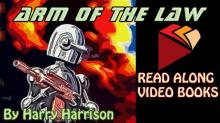 Arm of the Law
Arm of the Law The Velvet Glove
The Velvet Glove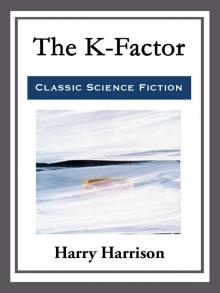 The K-Factor
The K-Factor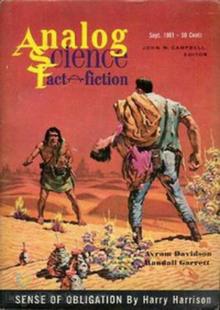 Sense of Obligation
Sense of Obligation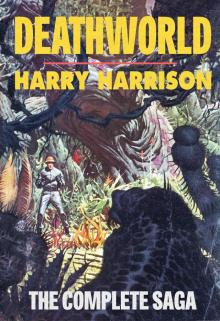 Deathworld: The Complete Saga
Deathworld: The Complete Saga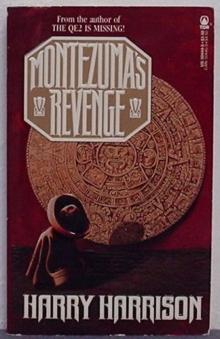 Montezuma's Revenge
Montezuma's Revenge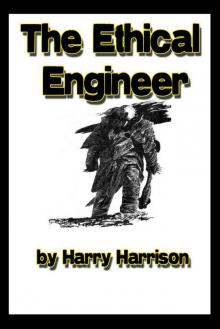 The Ethical Engineer
The Ethical Engineer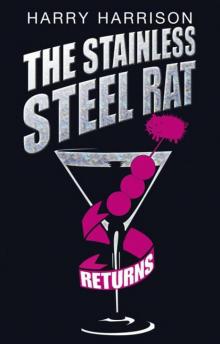 The Stainless Steel Rat Returns
The Stainless Steel Rat Returns The Misplaced Battleship
The Misplaced Battleship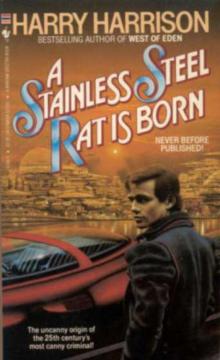 The Stainless Steel Rat is Born
The Stainless Steel Rat is Born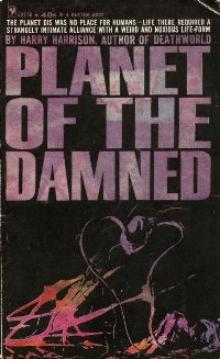 Planet of the Damned bb-1
Planet of the Damned bb-1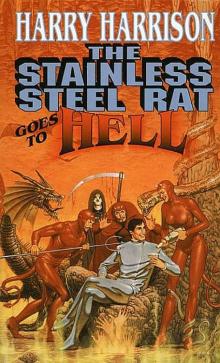 The Stainless Steel Rat Goes to Hell ssr-10
The Stainless Steel Rat Goes to Hell ssr-10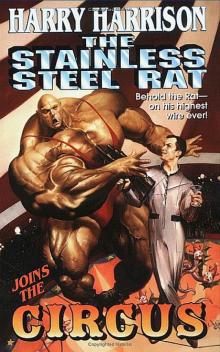 The Stainless Steel Rat Joins the Circus ssr-11
The Stainless Steel Rat Joins the Circus ssr-11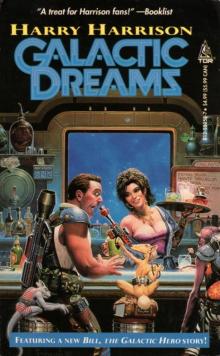 Galactic Dreams
Galactic Dreams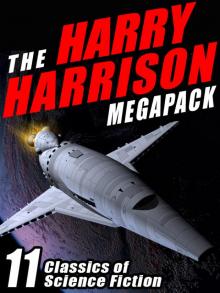 The Harry Harrison Megapack
The Harry Harrison Megapack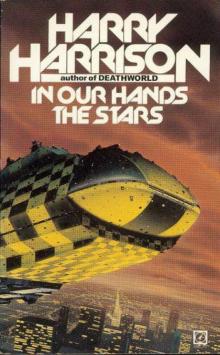 In Our Hands the Stars
In Our Hands the Stars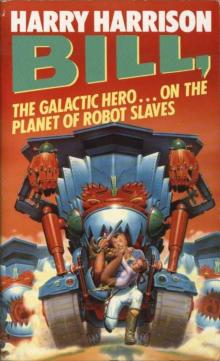 On the Planet of Robot Slaves
On the Planet of Robot Slaves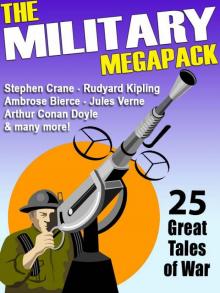 The Military Megapack
The Military Megapack Make Room! Make Room!
Make Room! Make Room! Wheelworld
Wheelworld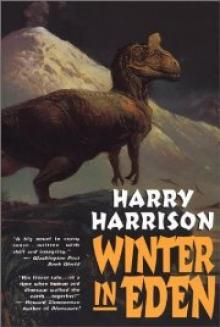 Winter in Eden e-2
Winter in Eden e-2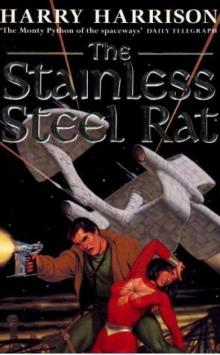 The Stainless Steel Rat
The Stainless Steel Rat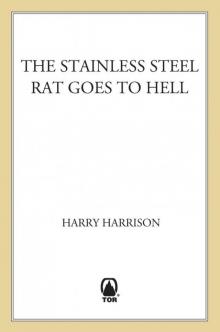 The Stainless Steel Rat Goes to Hell
The Stainless Steel Rat Goes to Hell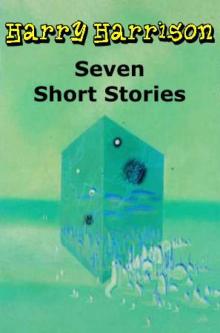 Harry Harrison Short Stoies
Harry Harrison Short Stoies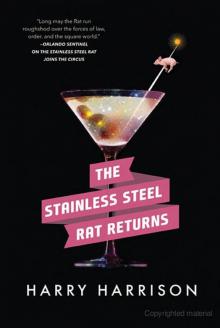 Stainless Steel Rat 11: The Stainless Steel Rat Returns
Stainless Steel Rat 11: The Stainless Steel Rat Returns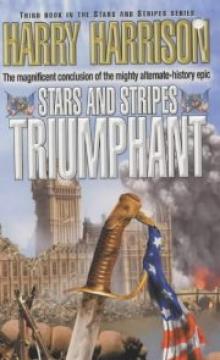 Stars and Stripes Triumphant sas-3
Stars and Stripes Triumphant sas-3 West of Eden
West of Eden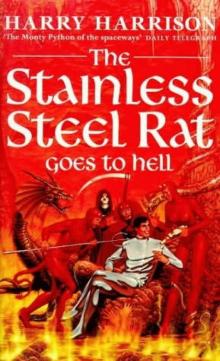 The Stainless Steel Rat Go's To Hell
The Stainless Steel Rat Go's To Hell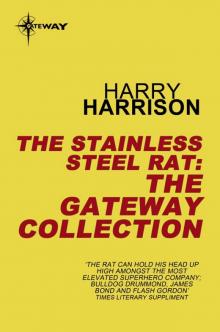 The Stainless Steel Rat eBook Collection
The Stainless Steel Rat eBook Collection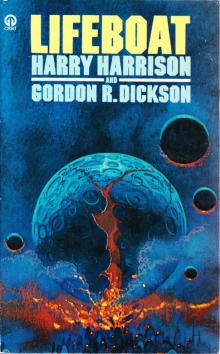 Lifeboat
Lifeboat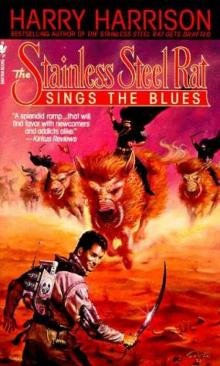 The Stainless Steel Rat Sings the Blues
The Stainless Steel Rat Sings the Blues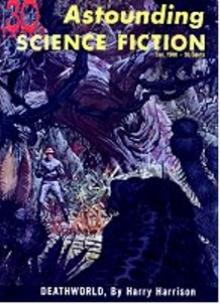 Deathworld tds-1
Deathworld tds-1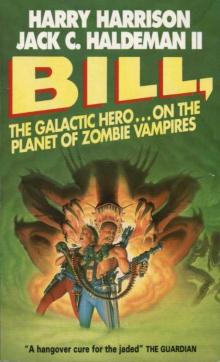 On the Planet of Zombie Vampires
On the Planet of Zombie Vampires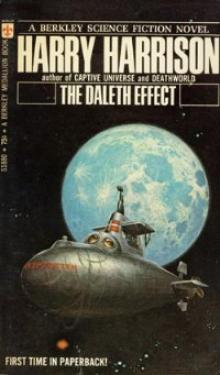 The Daleth Effect
The Daleth Effect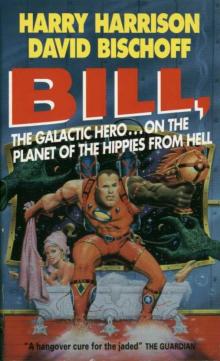 On The Planet Of The Hippies From Hell
On The Planet Of The Hippies From Hell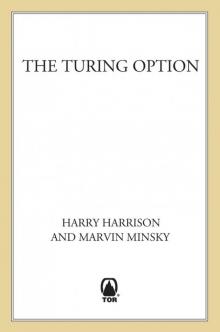 The Turing Option
The Turing Option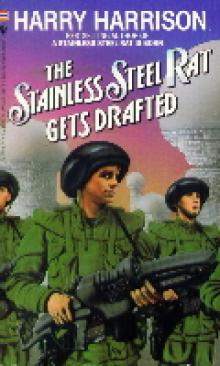 The Stainless Steel Rat Gets Drafted
The Stainless Steel Rat Gets Drafted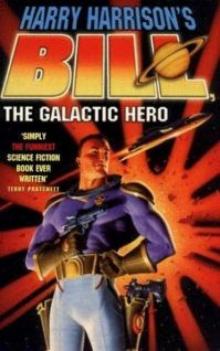 Bill, the Galactic Hero btgh-1
Bill, the Galactic Hero btgh-1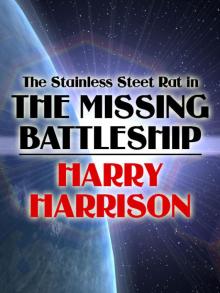 The Stainless Steel Rat in The Missing Battleship
The Stainless Steel Rat in The Missing Battleship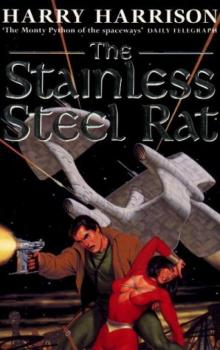 The Stainless Steel Rat ssr-1
The Stainless Steel Rat ssr-1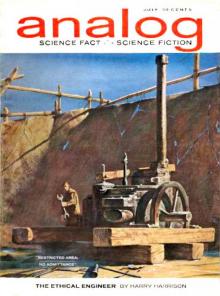 The Ethical Engineer (the deathworld series)
The Ethical Engineer (the deathworld series)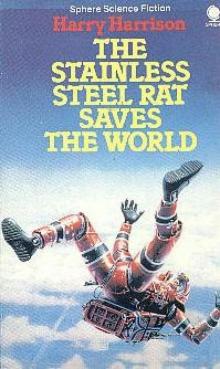 The Stainless Steel Rat Saves the World ssr-3
The Stainless Steel Rat Saves the World ssr-3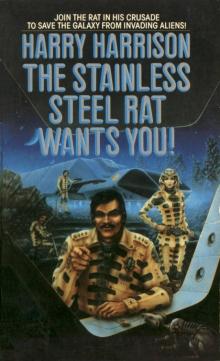 The Stainless Steel Rat Wants You
The Stainless Steel Rat Wants You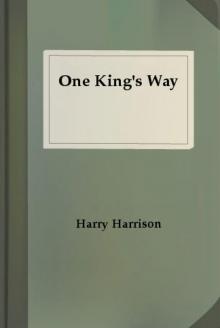 One King's Way thatc-2
One King's Way thatc-2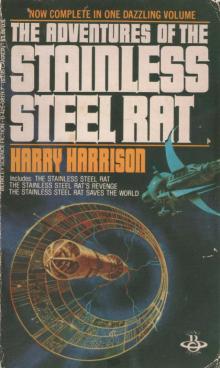 The Stainless Steel Rat Saves The World
The Stainless Steel Rat Saves The World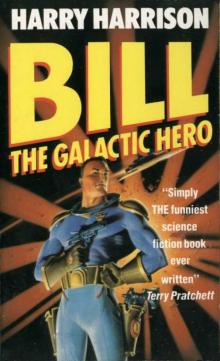 Bill, the Galactic Hero
Bill, the Galactic Hero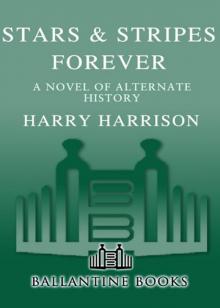 Stars & Stripes Forever
Stars & Stripes Forever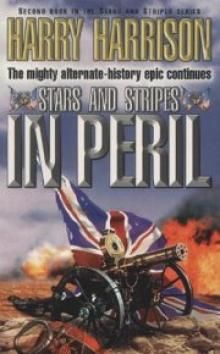 Stars and Stripes In Peril sas-2
Stars and Stripes In Peril sas-2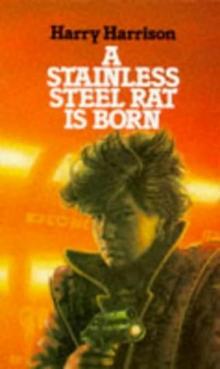 A Stainless Steel Rat Is Born ssr-6
A Stainless Steel Rat Is Born ssr-6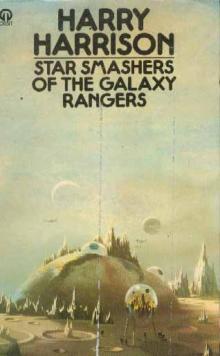 Star Smashers of the Galaxy Rangers
Star Smashers of the Galaxy Rangers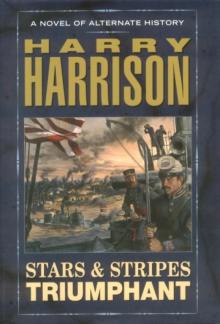 Stars & Stripes Triumphant
Stars & Stripes Triumphant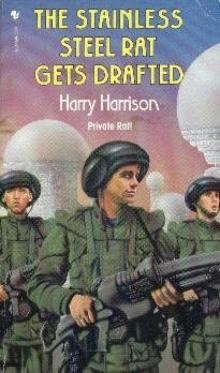 The Stainless Steel Rat Gets Drafted ssr-7
The Stainless Steel Rat Gets Drafted ssr-7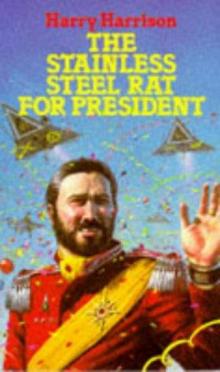 The Stainless Steel Rat for President ssr-5
The Stainless Steel Rat for President ssr-5 The Hammer & the Cross
The Hammer & the Cross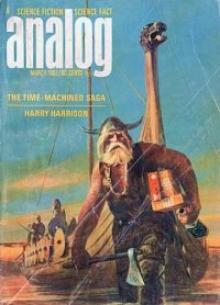 The Technicolor Time Machine
The Technicolor Time Machine The Hammer and The Cross thatc-1
The Hammer and The Cross thatc-1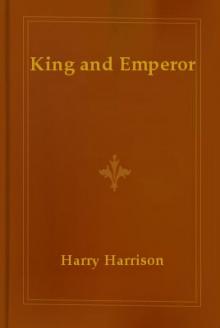 King and Emperor thatc-3
King and Emperor thatc-3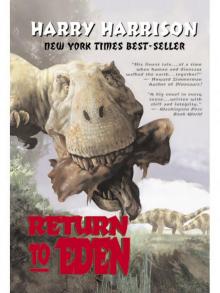 Return to Eden
Return to Eden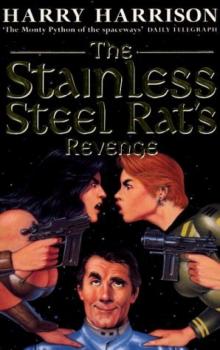 The Stainless Steel Rat’s Revenge ssr-2
The Stainless Steel Rat’s Revenge ssr-2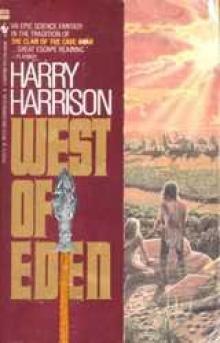 West of Eden e-1
West of Eden e-1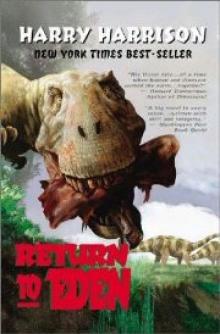 Return to Eden e-3
Return to Eden e-3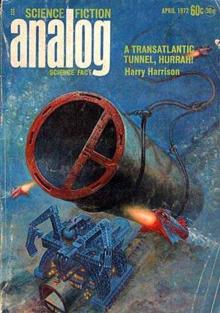 A Transatlantic Tunnel, Hurrah!
A Transatlantic Tunnel, Hurrah!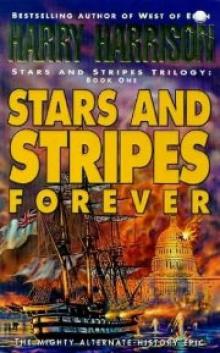 Stars and Stripes Forever sas-1
Stars and Stripes Forever sas-1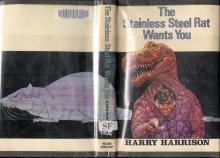 The Stainless Steel Rat Wants You ssr-4
The Stainless Steel Rat Wants You ssr-4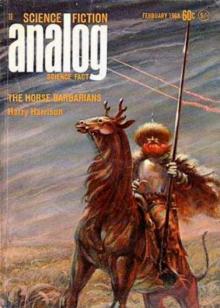 The Horse Barbarians tds-3
The Horse Barbarians tds-3 Planet of the Damned and Other Stories: A Science Fiction Anthology (Five Books in One Volume!)
Planet of the Damned and Other Stories: A Science Fiction Anthology (Five Books in One Volume!)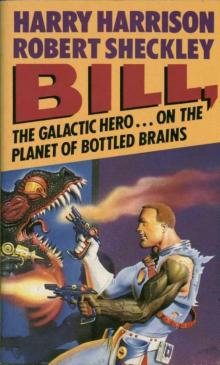 On the Planet of Bottled Brains
On the Planet of Bottled Brains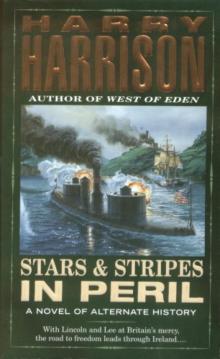 Stars And Stripes In Peril
Stars And Stripes In Peril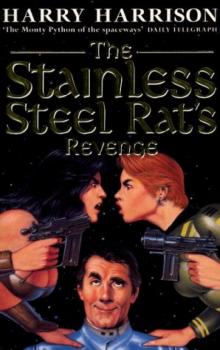 The Stainless Steel Rat's Revenge
The Stainless Steel Rat's Revenge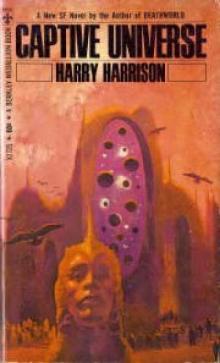 Captive Universe
Captive Universe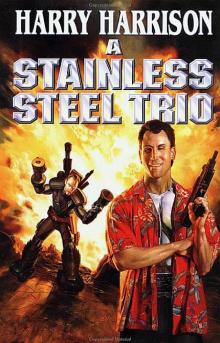 The Stainless Steell Rat Sings the Blues ssr-8
The Stainless Steell Rat Sings the Blues ssr-8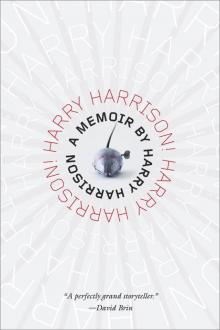 Harry Harrison! Harry Harrison!
Harry Harrison! Harry Harrison!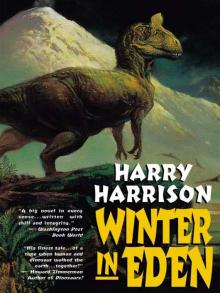 Winter in Eden
Winter in Eden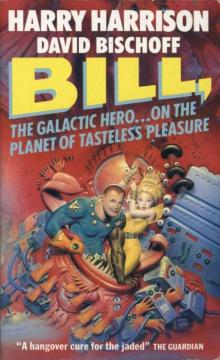 On the Planet of Tasteless Pleasures
On the Planet of Tasteless Pleasures